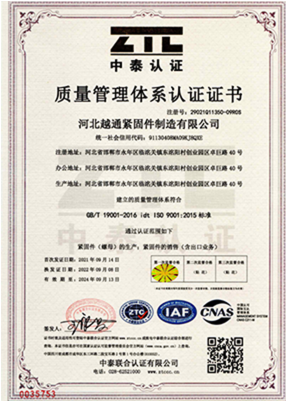Aug . 09, 2024 03:05 Back to list
High-strength hexagonal bolts grade 10.9 for industrial and mechanical applications and their advantages
Understanding Hex Bolt 10.9 Strength, Applications, and Importance
Hex bolts are crucial fasteners used in various industrial and construction applications, and among them, the hex bolt 10.9 stands out due to its high tensile strength and durability. Identified by its property class, 10.9 bolts are widely favored for heavy-duty applications and demanding environments. This article delves into the attributes, applications, and significance of hex bolt 10.9.
What is a Hex Bolt?
A hex bolt, commonly referred to as a hex head bolt, features a six-sided (hexagonal) head which is designed to be tightened or loosened using a wrench. These bolts come in different grades, sizes, and materials, making them versatile for various applications. The “10.9” designation is a property class denoting the bolt's mechanical properties—specifically its tensile strength, yield strength, and hardness.
Mechanical Properties of 10.9 Bolts
The property class 10.9 signifies that the bolt has a minimum tensile strength of 1,000 MPa (megapascals) and a yield strength of 900 MPa. This exceptional strength-to-weight ratio makes 10.9 bolts ideal for applications where high strength is crucial. The bolts' hardness rating typically ranges around 28 to 32 HRC (Rockwell Hardness Scale), indicating their ability to withstand wear and deformation under loads.
Material Composition
Hex bolts in class 10.9 are usually made from medium carbon steel, which may be heat treated to improve strength. They can be coated with zinc or other protective materials to enhance corrosion resistance. This adaptability in material and processing allows 10.9 bolts to perform well in various environments, including automotive, manufacturing, and construction sectors.
Applications of Hex Bolt 10
.9hex bolt 10.9

Given their robust properties, hex bolt 10.9 is used in a wide range of industries. Some common applications include
1. Construction In structural steel buildings, bridges, and other load-bearing structures, 10.9 bolts are crucial in providing the necessary strength to support heavy loads and withstand environmental stress.
2. Automotive Industry Hex bolts are extensively used in vehicles for assembling parts like engines, suspensions, and frames due to their strength and reliability.
3. Machinery and Equipment In heavy machinery, such as cranes and excavators, where vibrations and heavy loads are common, the robustness of 10.9 bolts ensure the integrity and safety of operations.
4. Aerospace Components that must endure extreme forces and conditions often use high-strength fasteners like hex bolt 10.9 to ensure performance and safety.
Importance of Choosing the Right Bolt
Selecting the appropriate fastener is paramount for any engineering or construction project. Using a bolt with insufficient strength may lead to structural failures, safety hazards, and significant financial losses. Therefore, understanding the specifications of bolts, such as the 10.9 hex bolt, allows engineers and builders to make informed decisions that ensure stability and durability.
Conclusion
In conclusion, hex bolt 10.9 plays a vital role in modern engineering and construction due to its impressive mechanical properties and diverse applications. Its ability to provide strength and reliability under demanding conditions makes it a preferred choice for industries ranging from construction to automotive and aerospace. As technology advances and materials evolve, hex bolt 10.9 remains a testament to the importance of robust engineering in achieving safety and efficiency across various sectors. Proper usage and understanding of these bolts contribute significantly to the overall success and integrity of mechanical and structural designs.


